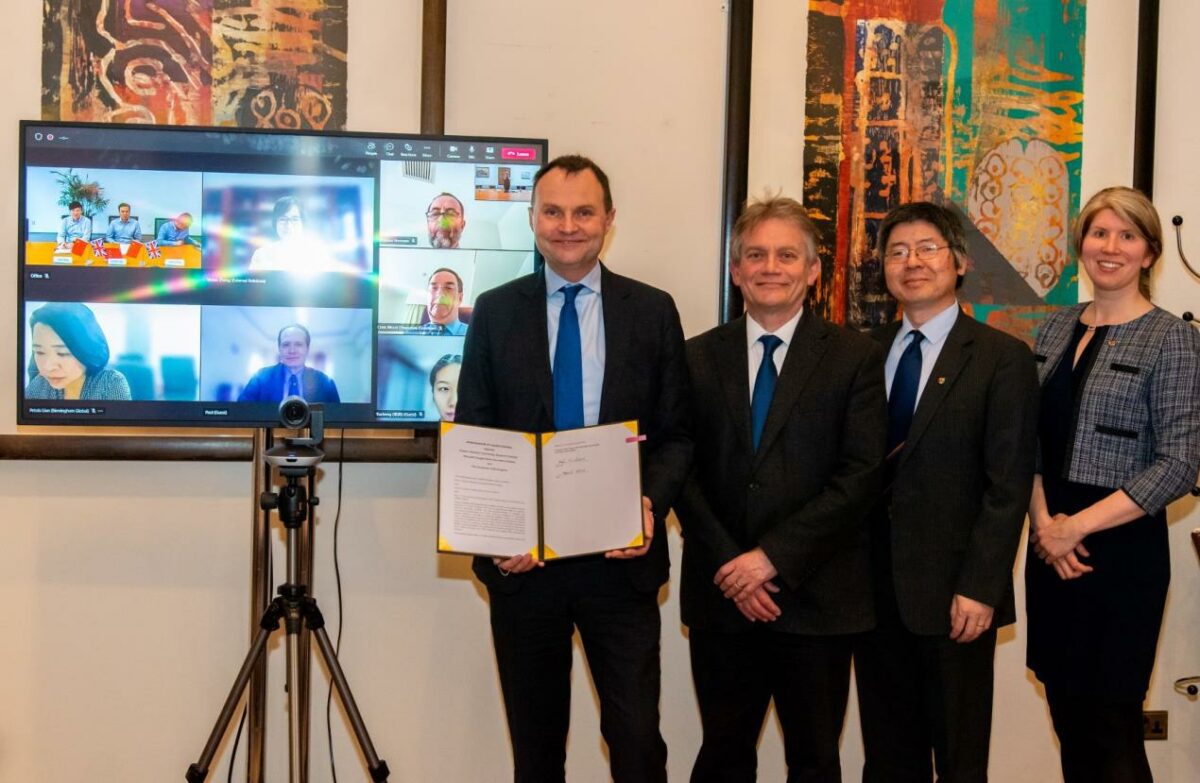Renewed University of Birmingham partnership strengthens technology innovation between UK and China

The University of Birmingham, Jiangsu Industry Technology Research Institute (JITRI), and Shanghai Yangtze Delta Innovation Institute have signed a new agreement to continue strengthening their joint development of innovative research that creates real-world impact.
Building on a six-year partnership, the new agreement will see the three partners progressing the development and commercialisation of outputs created through research projects already delivered by JITRI and the University of Birmingham.
Birmingham experts have worked with JITRI to develop innovative research in key areas such as nanoparticle technology, biomedicine, recycling solutions and low-carbon clean energy.
JITRI Chief Expert Dr Benjin LUO and University of Birmingham Vice-Chancellor Professor Adam Tickell signed the new agreement in a special online ceremony.
Professor Adam Tickell commented:
“Signing this agreement marks the beginning of the second phase of our partnership and I look forward to the University of Birmingham and JITRI working together to deliver considerable future success.
“We congratulate JITRI on expanding to become part of a new National Innovation Center spanning the entire Yangtze Delta Region (NICE), including the new Shanghai Yangtze Delta Innovation Institute (SYDII).
“With theirwide range of institutes that match Birmingham’s research strengths, JITRI and SYDII are major partners for research engagement in China.Our experts can provide strong innovation support for NICE through our wide and diverse research presence in China.”
The partnership with JITRI was initiated by Professor Zhibing Zhang, co-director of the University of Birmingham’s China Institute, in September 2015. This high-profile engagement led to the establishment of a fund worth £2.7m for joint projects, which was utilised to support six research projects.
Supported by the JITRI funded projects, and in partnership with Southeast University, the University of Birmingham established a joint laboratory in Suzhou at the Institute of BioMedical Devices. This important platform helps considerably in building sustainable research partnerships in China in the areas of biomaterials, biomedical engineering, medical devices, and testing kits.
The University of Birmingham also worked with JITRI and Germany’s Fraunhofer Institute to secure a £500,000 UK Government International Investment Initiative (I3) grant that leverages a further £2.7 million to develop recycling solutions and low-carbon clean energy.
Dr Paul Burrows, Vice President of JITRI, commented:
“The collaboration between JITRI and the University of Birmingham dates back to 2016 and we have carried out diverse and in-depth cooperation. It has been a very fruitful 5-year cooperation for JITRI, and we are now exploring further opportunities for the next 5 years.
“Now our Shanghai Yangtze Delta Innovation Institute adds a new overseas partner for the University of Birmingham. We hope it will bring yet more cooperation opportunities in the future.”
Established in 2013, JITRI plays a crucial role in promoting and supporting industrialisation and commercialisation of advanced technology research that may have significant impact on the economic development of Jiangsu Province.
The National Innovation Center par excellence (NICE) aims to develop an integrated innovation ecosystem across the Yangtze Delta Region, ultimately including three Provinces (Jiangsu, Zhejiang and Anhui) and one metropolitan area (Shanghai).
JITRI has 67 specialty research institutes and over 11,000 research staff, with seven industrial technology innovation centres in the fields of nanotechnology, medical equipment, intelligent equipment, lasers and optoelectronics, telecommunications and networks, environmental-protection equipment, and the ‘Internet of Things’.
As well as partnering with the University of Birmingham, JITRI has also built links with other leading research institutes around the world, including the Universities of Oxford, Michigan, and Monash.











Responses